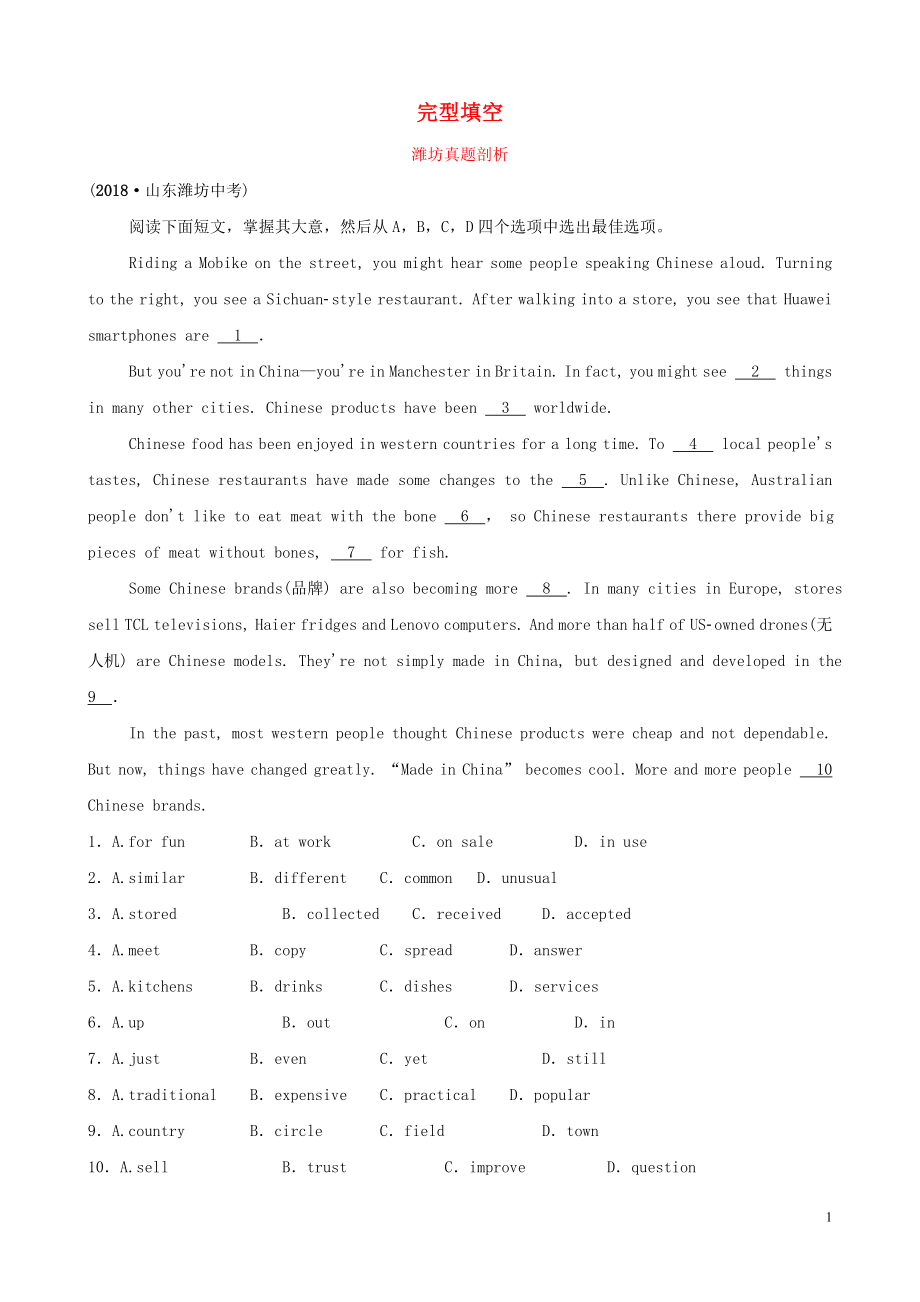《山東省濰坊市2019年中考英語題型專項(xiàng)復(fù)習(xí) 題型二 完型填空真題剖析》由會(huì)員分享,可在線閱讀,更多相關(guān)《山東省濰坊市2019年中考英語題型專項(xiàng)復(fù)習(xí) 題型二 完型填空真題剖析(3頁珍藏版)》請?jiān)谘b配圖網(wǎng)上搜索�����。
1���、完型填空
濰坊真題剖析
(2018·山東濰坊中考)
閱讀下面短文��,掌握其大意���,然后從A,B���,C���,D四個(gè)選項(xiàng)中選出最佳選項(xiàng)�。
Riding a Mobike on the street, you might hear some people speaking Chinese aloud. Turning to the right, you see a Sichuan-style restaurant. After walking into a store, you see that Huawei smartphones are 1 .
But you're not in Chin
2、a—you're in Manchester in Britain. In fact, you might see 2 things in many other cities. Chinese products have been 3 worldwide.
Chinese food has been enjoyed in western countries for a long time. To 4 local people's tastes, Chinese restaurants have made some changes to the 5 . Unlik
3、e Chinese, Australian people don't like to eat meat with the bone 6 , so Chinese restaurants there provide big pieces of meat without bones, 7 for fish.
Some Chinese brands(品牌) are also becoming more 8 . In many cities in Europe, stores sell TCL televisions, Haier fridges and Lenovo compu
4、ters. And more than half of US-owned drones(無人機(jī)) are Chinese models. They're not simply made in China, but designed and developed in the 9 .
In the past, most western people thought Chinese products were cheap and not dependable. But now, things have changed greatly. “Made in China” becomes cool
5�、. More and more people 10 Chinese brands.
1.A.for fun B.a(chǎn)t work C.on sale D.in use
2.A.similar B.different C.common D.unusual
3.A.stored B.collected C.received D.a(chǎn)ccepted
4.A.meet B.copy C.spread D.a(chǎn)nswer
5.A.kitchens B.drinks C.dishes D.services
6、6.A.up B.out C.on D.in
7.A.just B.even C.yet D.still
8.A.traditional B.expensive C.practical D.popular
9.A.country B.circle C.field D.town
10.A.sell B.trust C.improve D.question
參考答案
【答案及解析】
1.C for fun“為了消遣”;at work“在工作”;on sal
7�、e“在售”���;in use “在使用中”��。結(jié)合語境可知��,在進(jìn)入一個(gè)商店后會(huì)看到產(chǎn)品在出售�,故選C���。
2.A similar“類似的”���;different“不同的”�����;common“共同的”���;unusual“不尋常的”。結(jié)合上下文可知不僅在中國��,中國產(chǎn)品熱銷�����,在其他國家中國產(chǎn)品也很受歡迎�����,故此處表示在其他國家你也會(huì)看到一些類似的事情��。故選A�。
3.D store“儲(chǔ)存”���;collect“收集”���;receive“收到”�;accept“接受”�。結(jié)合上下文可知���,中國產(chǎn)品在其他國家也很受歡迎��,故被廣泛接受�����。 故選D。
4.A meet“遇見�����;滿足”�;copy“復(fù)制”���;spread“傳播”;answer
8�、“回答”�����。由下文“Unlike Chinese, Australian people don't like to eat meat with the bone...”可知中國餐廳為了滿足澳大利亞人的吃飯習(xí)慣,為他們提供沒有骨頭的大塊肉�,由上述例子可知中國餐廳為了滿足當(dāng)?shù)厝说目谖?,做出了一些改變�����。故選A�。
5.C kitchen“廚房”;drink“飲料”;dish“菜肴”��; service“服務(wù)”。結(jié)合語境可知��,為了滿足當(dāng)?shù)厝说目谖?����,中餐館已經(jīng)對菜做了一些改變。 故選C�。
6.D up“向上”��;out“在外面”�����;on“在上面”��;in“在里面”���。根據(jù)常識(shí)�����,“骨頭”和“肉”的關(guān)系是骨頭包在肉里
9�����、面�,肉附在骨頭上。此處表示“澳大利亞人不喜歡吃有骨頭的肉”�,故選D。
7.B just“剛剛”�����;even“甚至”��;yet“已經(jīng)”�����;still“仍然”��;此處表示“所以中餐館提供大塊的沒有骨頭的肉���,甚至對于魚肉。”�����,根據(jù)常識(shí)可知魚刺比較難挑�,故此處用“even”,表示程度更深���。
8.D traditional“傳統(tǒng)的”���;expensive“昂貴的”;practical“實(shí)際的�;實(shí)用性的”;popular“受歡迎的”�。上文講到“中餐受到西方國家喜愛”,下文提到在歐洲國家一些商店賣中國品牌的家電等���,故可知中國品牌在變得更加受歡迎���。
9.A country“國家”; circle“圓圈�����;循環(huán);周期”�����;field“田野���;領(lǐng)域”���;town“城鎮(zhèn)”。結(jié)合語境可知此處表示“這些產(chǎn)品不是簡單地在中國制造��,而是在這個(gè)國家設(shè)計(jì)和發(fā)展的�����?!贝颂巘he country指代上文的China。
10.B sell“賣”���;trust“信任”;improve“提高”�;question“質(zhì)疑”。上文講到“過去���,大多數(shù)西方人覺得中國產(chǎn)品便宜�、不可靠”,而but now后句意發(fā)生轉(zhuǎn)折���,故可推知“越來越多的人們信任中國品牌�����?��!保蔬xB�。
3
 山東省濰坊市2019年中考英語題型專項(xiàng)復(fù)習(xí) 題型二 完型填空真題剖析
山東省濰坊市2019年中考英語題型專項(xiàng)復(fù)習(xí) 題型二 完型填空真題剖析

